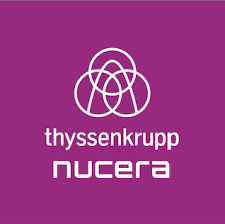High growth potential of India’s electrolysis market and access to a very attractive skilled labor market

thyssenkrupp nucera continues to actively press ahead with its expansion plans. The world’s leading supplier of highly efficient electrolysis plants for producing green hydrogen has opened a new office in Mumbai, India.
This new site in Vikhroli in northeast Mumbai is characterized by an excellent location at one of Asia’s most important ports. The available sales and engineering competence center (hub) will also help thyssenkrupp nucera to grow more strongly in India. The hub in Mumbai will also support the global activities of the electrolysis specialist in the areas of engineering and project execution – especially in Middle East, Asia, and Australia.
Mumbai will be thyssenkrupp nucera’s eighth location after Milan (Italy), Houston (USA), Riyadh (Saudi Arabia), Tokyo & Okayama (Japan), Shanghai (China), Perth (Australia), and the company headquarters in Dortmund (Germany). With around 30 employees at the start and more than 80 within three years, Mumbai will be one of thyssenkrupp nucera’s fastest growing international locations.
“We have a long history in India and close relationships with our customers here, now for more than 40 years. With our new location, we are strengthening our presence with our customers. It will enable us to respond even better to our customer’s various needs and demands. Mumbai is a logical choice as the economic center of the country,” says Vaidyanathan Nagarajan, Managing Director of thyssenkrupp nucera India Private Limited.
“India is the ideal expansion of our portfolio of locations for us. Skilled workforce available throughout India gives us even better access to talent and already experienced electrolysis specialists. Facing the background of the increasing shortage of skilled engineers, this is also an important factor,” says Dr. Arno Pfannschmidt, CFO of thyssenkrupp nucera AG & Co. KGaA and responsible for the India business, citing another advantage of the new location.
Speaking about the Indian electrolysis market, he says: “India’s location as a hub for the South Asian market, the good conditions for renewable power generation as an indispensable basis for green hydrogen, and the high demand for cost-efficient electrolysis technology make the Indian market so special. It plays a key role in realizing our growth ambitions in Asia.”
India is considered one of the future markets for electrolysis. In the chlor-alkali sector, thyssenkrupp nucera already has a leading market position there with a market share of more than 70 percent, which is to be further consolidated with the help of the new office. The development of the chlor-alkali market is closely linked to the positive development of India’s gross domestic product, and India is one of the most rapidly expanding economies in the world. According to estimates, the Indian economy could become the world’s third-largest economy by 2050, and even the second-largest by 2075.
In addition, India has great potential to produce green hydrogen on an industrial scale through alkaline water electrolysis. “At thyssenkrupp nucera India, we want to exploit this potential to develop the local market as a long-term complement to our chlor-alkali activities,” says Kiran Paul Joseph, Executive Director – Finance of thyssenkrupp nucera India.
India is the world’s third largest emitter of CO₂. Here, demand for green hydrogen is expected to rise sharply within the next few years. The Indian government has set itself the goal of expanding production capacities in its own country to 5 million metric tons of green hydrogen annually by 2030, which corresponds to an electrolysis capacity of around 50 gigawatts. India intends to meet their own demand and at least 10 percent of global demand. Europe is set to be the central target market. In the long run, India plans to have more than 10 million metric tons of annual capacity.
Subscribe to our newsletter & stay updated.